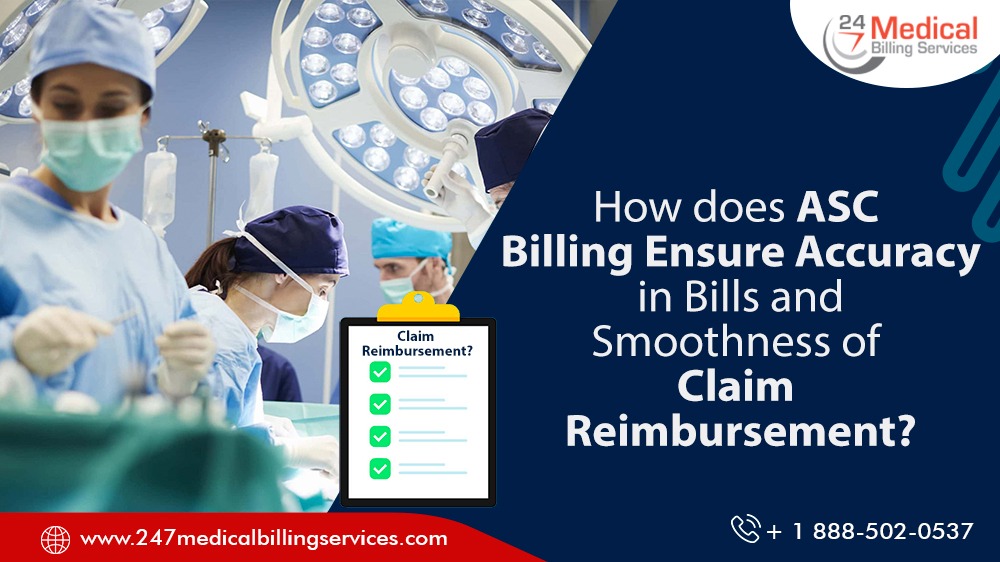
How does ASC billing ensure accuracy in bills and smoothness of claim reimbursement?
It’s the outpatient surgical services that are primarily provided by ASCs (Ambulatory Surgery Centers). Such services can be a part of big hospitals or operate as standalone surgical centers. Although Ambulatory Surgery Center (ASC) Billing claims seem to be alike regular medical claims, they are quite different in terms of filing. ASC billing claims are filed on the HCFA 1500 or 837P, whereas UB-04 or 837I is used to file the hospital outpatient surgical claims. ASC billing requires extra caution as even minor errors can result in massive claim denials. Here we discuss about ASC billing ensure accuracy in bills and smoothness of claim reimbursement.
Let's take a look at the different ways to improving Ambulatory Surgery Center Billing:
- Clarify the Collections Process
Communication with patients must be open and transparent if ASC medical claims billing efforts are to be more efficient. Make sure that new patients are aware of their financial responsibility for numerous services rendered.
A sign in the reception area explaining the payment system will also be beneficial, as patients will be unable to claim ignorance of your policy at a later stage. To ensure timely billing collections, collect ASC billing related information from patients on the same day, including a copy of their photo ID and an insurance card for your records.
- Automation of Basic billing functions
Forcing employees to perform tasks that can be performed more easily by automated systems is a drain on your healthcare business. It lowers morale and frustrates employees who could otherwise focus on providing more patient-centered, personalized services. Identify routine and mind-numbingly repetitive ASC billing tasks. Payment reminders must be issued, individual claims must be filed, and assistance in choosing the appropriate ASC medical billing codes should be provided.
- Monitor Denials
Whether a practice outsources ASC billing and coding operations or processes claims in-house, having a system of balances and checks in place will enhance your first-pass rates.
Instead of scolding staff for mistakes, one should work with the mindset that every rejection is an opportunity to enhance the ASC billing and coding process. When you see higher-than-expected denial rates, for example, it could be a sign that your scouring procedure is inadequate for your current workflow or your in-house team needs advanced training.
The following are common reasons for denials:
- Physicians lack the necessary credentials.
- Lack of sufficient documentation to back up your claims.
- Codes are used by your team for services or equipment that are not covered by insurance providers.
Tracking denial codes may reveal simple steps your practice can take to improve efficiency. Sending chart notes and ASC billing services to the outsourcing billing experts on a daily basis, for example, could save time and improve accuracy. Similarly, if claims are consistently returned for services deemed "non-covered," it may be time to review your coverage verification process as well as your coding protocols.
- Improve Quality Control
To be sure, eliminating claim errors is critical for the financial health of your practice. However, once a claim is approved, the ASC billing and collection process does not end. Medical healthcare providers can keep a close eye on cash flow by using generally accepted accounting practices to post and record payments.
Create a deposit log for each receipt and send it to the ASC billing team to improve account balance accuracy. The log must include all information required to ensure proper posting and to allow reviewers to easily confirm correct payment amounts posted to the correct accounts.
A log should include the following basic information:
- Name of the patient
- Account number
- Cash Receipt Number
- Amount owed
- Service date or referral reference number
- Follow Up on Delinquent Claims
How much money is on its way to your practice? The percentage of delinquent claims awaiting service will be revealed by answering this question. A dedicated biller should be assigned to review account aging in order to determine which claims are not being paid on time.
You may discover communication issues with insurance providers or patients after thoroughly reviewing aged accounts receivable. Are the delinquencies the result of ASC medical biller mistakes? Is it easy for patients to understand your statements? Is your ASC billing and coding partner processing your claims quickly?
High delinquency rates indicate a larger issue. When you consistently review delinquent accounts with an eye toward improving performance, you can meet these problems early on when they are easier to solve. It is critical to implement processes and patterns that will assist your ASC billing and coding team in filing claims faster and more efficiently in order to maximize revenue cycle management.
Outsource Your Difficult Collections
You may be hesitant to consider outsourcing of your ASC billing and coding operations as you have been providing services in the community for many years. However, keeping an open mind is prudent, especially when the efficiency of your revenue cycle is at stake. Working with a third-party revenue cycle management services provider such as 24/7 Medical Billing Services frees up your staff by delegating more difficult collections to experts.
They will use compassion and sensitivity to assist your patients in dealing with their outstanding bills, such as setting up a payment plan. Finally, reviewing the ASC medical billing cycle from the initial patient contact to check deposit will allow you to improve the claims process and capture reimbursements more efficiently, resulting in improved cash flow.
Read more: What Works For Your ASC Billing – In-House Or Outsourcing?

.png)